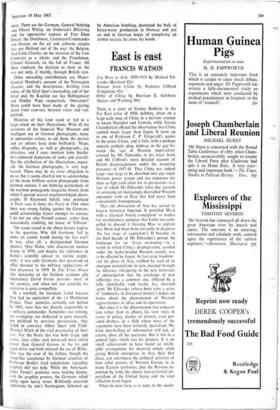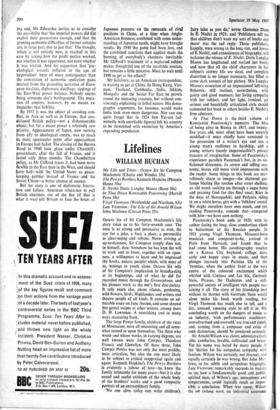East is east
FRANCIS 'WATSON
The West in Asia. 1850-1914 by Michael Ed- wardes (Batsford 42s) Retreat from China by Nicholas Clifford (Longmans 42s) • Orbit of China by Harrison E. Salisbury (Secker and Warburg 30s)
There is a story of Stanley Baldwin, in the Far East crisis of 1926, dabbing about on a large-scale map of China in a hesitant attempt to locate Shanghai and Tientsin, while Austen Chamberlain offered the observation that China seemed much larger than Japan. It turns up in one of Professor C. P. Fitzgerald's guides to the newer China; and it falls, with a perhaps unjustly pathetic plop, midway in the gap be- tween the 'age of Western imperialism' covered by Mr Edwardes in his latest book and Mr Clifford's more detailed account of British disentanglement under the mounting pressures of 1937-41. That China was indeed large—too large to be absorbed into any single Western power system and too expensive for them to fight each other for its possession—is a fact of which Mr Edwardes takes due account in surveying an increasingly diversified Western encounter with an East that had never been conveniently homogeneous.
That old abstraction of Asia has served its bizarre historical function. It provided Marx with a 'classical Asiatic conception' so useless for revolutionary purposes that Lenin was com- pelled to discard it (leaving Mau to explain that Marx had been born too early to diagnose 'the last stage of capitalism'). It became, in the final decade of Mr Edwardes's period, the landscape for an 'Asian awakening'—to a world in which China's disintegration, avoided under the hydra-headed Western assault, was to be effected by Japan. At last came freedom : and the ghost of Asia, stabbed by each of its emergent nationalisms in turn, moaned through the libraries, whispering to the new historians of emancipation that the catalogue of past sufferings was a common one, inflicted by a fully identifiable (and hardly less abstract) agent. Mr Edwardes (whose book joins a series of 'landmarks in European history') makes no bones about the phenomenon of Western aggressiveness, its ideas and its operations.
But since it is the phenomenon that concerm him rather than its effects, his view takes in issues of policy, clashes of interest, even per- sonal dramas, in a field where most of the arguments have been minutely specialised. His brisk marshalling of information will not, of course, close all the questions. But it lets in a general light, which was his purpose. It is no small achievement to have found an intelli- gible arrangement for material which, while giving British enterprises in Asia their first place, can encompass the political activities of nine other powers of Western Europe in as many Eastern territories, plus the Russian ex- pansion by land, the almost non-territorial im- perialism of the United States and the vital reflection from Japan.
When he does turn, as it were, to the receiv- ing end, Mr Edwardes invites us to consider the possibility that 'the imperial powers did not exploit their possessions enough, and that the growing economic difficulties of former colonies are, in large part, due to just that.' The thought, which is not entirely new, is reached in this case by asking how the profit motive worked, not whether it was uppermost, nor even whether it was wicked. And his suggestion that 'psy- chological wounds inflicted in the age of imperialism' were of more consequence than the convention of economic spoliation gains interest from the preceding narrative of Euro- pean rivalries, diplomatic duellings, tippings of the East-West power balance. Nobody enjoys being someone else's battleground. The muta- tion of empires, however, by no means ex- tinguishes that liability.
By 1937 it was the object of avoiding con- flict, in Asia as well as in Europe, that con- ditioned British policy—not a dishonourable object, but for a major power a relatively new priority. Appeasement of Japan, now turning from ally to ideological enemy, was to reach its most spectacular point after appeasement in Europe had failed. The closing of the Burma Road in 1940 took place under Churchill's government, after the fall of France, and it lasted only three months. The Chamberlain policy, as Mr Clifford traces it, had been more flexible in the East than in the West, and should have had—with the United States as peace- keeping partner instead of France and the Soviet Union—a better chance of success.
But the story is one of diplomatic frustra- tion and failure. American reluctance to pull British chestnuts out of the fire (if that is what it was) left Britain to face the brunt of
Japanese pressure on the remnants of rival positions in China, at a time when Anglo- American firmness, combined with some under- standing of Japanese needs, might have brought results. By 1940 the game had been lost, and the combined sanctions then applied made the burning of everybody's chestnuts inevitable. Mr Clifford's treatment of a neglected subject makes thoughtful use of the available sources, but remains a little tentative. Must he wait until 1990 to get at the others?
Mr Salisbury, as an American correspondent, is waiting to get at China. In Hong Kong, Viet- nam, Thailand, Cambodia, India, Sikkim, Mongolia and the Soviet Far East he prowls round the menacing creature, but without con- vincingly explaining its lethal nature. His demo- graphic arguments, for instance, would make India look even more dangerous. Nor can one quite forget that in 1924 Sun Yat-sen (ad- mittedly with unreliable figures) felt his country to be threatened with extinction by America's expanding population.



































 Previous page
Previous page